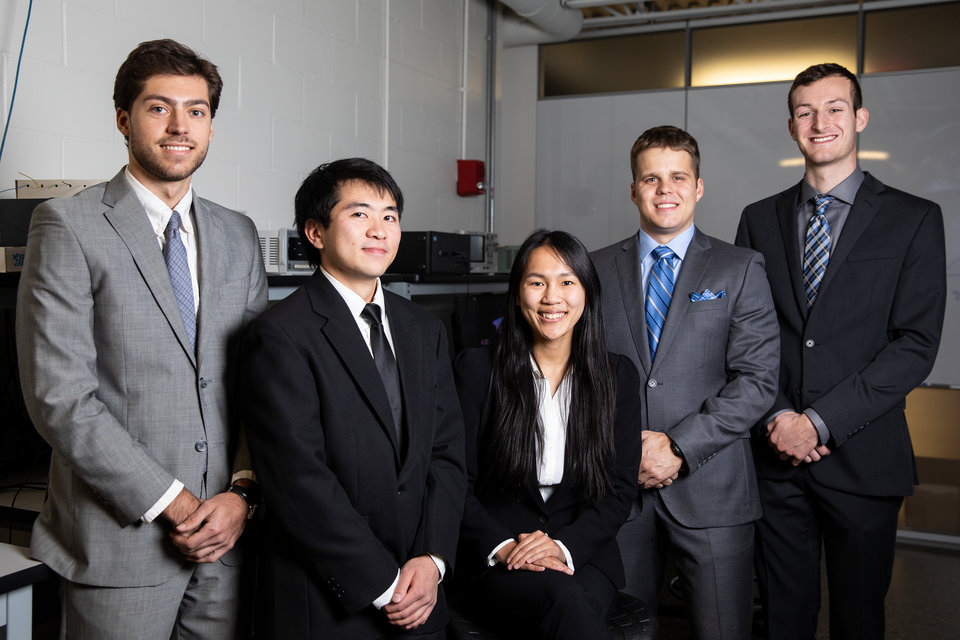When Kelly Mallon decided to pair her mechanical engineering major with a peace engineering minor, her plan was to work on environmental or social sustainability issues after graduation. When an opportunity to work in her field arose last summer – before she even earned her degree – Mallon jumped at the chance.
Mallon joined four other mechanical engineering seniors – Joseph Lee, Brett Marshall-Cieciuch, Nick Turch and Derek Van – for seven weeks in Amman, Jordan, as part of the School of Engineering’s inaugural Global Summers Senior Design program. While overseas, Mallon and her teammates started work on creating a dehydrator specifically for jameed, a dried yogurt that serves as the main ingredient of the popular Jordanian dish, mansaf.
Students design a dehydrator
“There’s a women’s cooperative that makes jameed as part of funding their cooperative,” Mallon said. It takes about a week for jameed to dry outside in the sun. “Our goal was to find a way to dry jameed faster, within maybe three days, so the women could output more and work year-round. That could potentially get them out of poverty and empower them.”
Before the trip, the team learned about their project and received a crash course in survival Arabic. While in Jordan, they attended a class, Engineering and Design for Sustainable Environments, through the School for International Training. They kept up with their senior design lectures, Skyped weekly with their faculty adviser back in St. Paul – Dr. John Wentz – and started work on the jameed dehydrator.
“We met with a main sponsor, the woman who was the head of the cooperative,” Turch said. “We made a lot of visits to the location and asked many questions about the process and ways they thought it could be improved. She didn’t speak English, so we used translators.”
Lee, who is in the Reserve Officers’ Training Corps program, was eager to go on the Jordan trip because it provided a chance to work on an engineering program in another country. He had a particular interest in the Middle East and had taken Arabic classes a couple years ago.
Lee said their goal in Jordan was to gather information. “The main thing is we walked away with a really firm and deep understanding of what needed to be accomplished and how the sponsor wanted to see it.”
The team did fieldwork, studied and immersed themselves in a foreign culture – including individual home stays – without a faculty member on site. Mallon said that while having a faculty member in Jordan might have been helpful, she is happy the team was on its own.
“It was a good opportunity,” she said. “We had ownership of our own work, and we had to be accountable to ourselves; that’s what it’s going to be like in the real world.”
Once the team completed its work in Jordan, it returned to St. Thomas for a critical design review followed by building a prototype and testing the dehydrator. In February it was sent to Jordan to be tested. Another team of students will travel back to Jordan this summer to work with the women’s cooperative to identify ways to enhance the dehydrator’s functionality.
Understanding global clients
Dr. Camille George, associate dean of engineering, believes it is important in today’s world for engineering students to be able to navigate various work environments and experience different cultures.
“We’re asking our engineers to create things in the future, so we’re asking them to be innovative, to be creative, to be curious,” George said. “But for them to add value and make connections, they have to have a really deep understanding of who the customer is.”
This summer, the Global Summers Senior Design Program will expand to a second location: Cuzco, Peru, where students will work with The Andean Alliance for Sustainable Development on a high-altitude environmental project.
“We have various students who are interested in these projects – students who are curious about the world and have a global perspective and how that fits in with engineering,” George said. “These projects start students thinking about engineering for the base of the economic pyramid, and that usually isn’t what people think about. Most engineers think of working for companies, and they are working to get products out to the market, but this is very specific. Can we do a better job of having engineers look at the social domain and problems in the social domain? We will not do that unless we give people practice.”
For the five mechanical engineering students who spent their summer in Jordan, it is an experience they will never forget, and one with the potential to set them apart from their peers.
“For me, I have a guaranteed job with the Air Force when I graduate, but still, to be able to say to my superiors I’ve worked with locals in a foreign country, and to have that feeling of complete ownership of design and the whole project in Jordan, I think that’s very valuable,” Lee said. “I think a lot of hiring companies will look at our experience very favorably, even years later.”
The main goal is to create a dehydrator for the women’s cooperative that is effective.
“There are going to be several iterations where future design teams will come in, but ideally, within a couple of years there will be many women within the cooperative who will have a dehydrator based on our design, and they’ll be able to dry jameed in their households year-round,” Turch said. “We would be the pioneers of that. It would be pretty awesome.”







